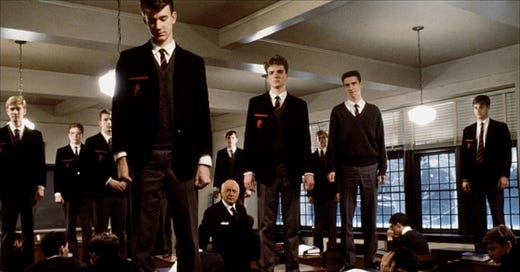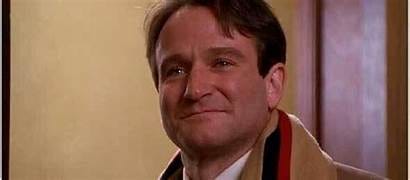One of my favorite movies is the problem
The sad realization that Mr. Keating has created what we are witnessing.
I’ve long had a love affair with Peter Weir’s movie, “Dead Poets Society.” In fact, I’m listening to the soundtrack while I type this. It has all the perfectly curated hallmarks of the dark academia world that many of us, for any number of reasons, did not experience.
I worked my way through high school and college, never much enjoyed the classes I was forced to take, never lived on campus, and didn’t once study in the school library. I went to high school and college in California, sandwiched between working full-time to pay for my apartment and later to pay for my husband’s Master’s Degree. It was never, not one time, glamorous.
This means that any film, book, or television show that takes place in the halls of storied institutions appeals to me. I didn’t experience it and so I now wonder what I missed out on (if anything.)
- - - - -
I first watched DPS when I was in high school and thought the entire idea of going to an all-girls school or being shipped away in general (before 18) was bizarre but intriguing. Living in college-like dorms and having built-in friends and cafeteria meals? Exciting and new!
I, like many viewers, instantly fell in love with the protagonist of the movie (well, the antagonist) Mr. Keating, and several of the important male actors (Neil, obviously.) The film isn’t hiding the fact that Keating was the “hero” in their opinion, but after three decades of thinking about it, I’ve come to the sad conclusion that the professor was actually the catalyst to a lot of the rot we are seeing play out on college campuses in America, currently. The movie itself is a harsh (but somewhat subtle) critique of boomer liberalism.
How is it possible that the movie I so deeply adored could actually be messaging things with which I vehemently disagree? The subtly of the film along with this generation’s inability to fully think through concepts, (but rather rely on feelings and emotions when making consequential arguments) made it possible.
Allow me to explain.
The movie takes place at a prep school where the male students are sent to (obviously) prepare them for their future endeavors. You can tell from the first few moments of the film that it’s fundamental to establish that these children were shipped there by parents who desire their minds and hearts to be filled with the necessary wisdom and knowledge that will guide their lives. Just like parents of this current moment, the parents of students in DPS would say that they are making a choice to place their sons in an atmosphere that will test them, push them, and challenge them in ways they don’t love, but will hopefully churn out a whole men in the end.
If you’re watching carefully you’ll notice that the parents are automatically depicted as the bullies, as the enemies. Neil’s parents don’t want him acting in the local theatre production, and one of the other main characters laments that his parents bought him a desk set of pens and stationery (the horror!) Around every turn, the parents who sent them to (what can only be assumed) a very expensive institution are the baddies because they won’t let their 16-year-old sons do whatever the heck they want.
Enter stage left: Mr. Keating. We aren’t but 5 minutes into the scene where he is introduced and he’s asking the students to observe the past alumni at the school and imploring the boys to SEIZE THE DAY!!, obviously capitalizing on their desire to define themselves and rebel. He makes it clear that NOW is the time to establish their individuality and their personal desires. He does this multiple times, such as when he’s instructing them on poetry and he rejects any structure or form to the words…rather prioritizing feeling and freedom of expression, thought, and opinion. The students are inspired. They run with it.
Sure, that sounds like a wonderful idea, but if you sit with it long enough you’ll realize that it’s quite dangerous when prioritized, in the hands of 14-17yr olds. That is precisely what the movie and Mr. Keating do. He encourages and celebrates an atmosphere of rebellion (see Neil outright defying his parents) in favor of self-expression and personal ideology.
And what did this produce in the film? Well, to begin with, Neil’s parents were portrayed as villains and eventually portrayed as apologetic, heartbroken parents who caused their son’s suicide. Yes, Neil committed suicide when his father chastised him for going behind his back and defying his orders (which happens all the time if you’re parenting correctly, but none of that context was given.)
Unsurprisingly, the prep school blames Keating for the suicide and if you’re anything like me in my mid-twenties, you watched these scenes with a burdened sense of injustice because “Keating was only inspiring the students!” but what you’re missing is that your judgment toward the administration is misguided. You miss the fact that Keating’s initial teaching was to encourage his students to quiet themselves and listen to those who have gone before (the dead) AND YET the dead were subjects to tradition and the beautiful process of being submissive and learning from those who know better than you do.
The thing that I believe links perfectly to our current moment is that, like in the film, we are pushing and promoting children and young adults to “live authentically” and “CARPE DIEM!” before they have had the opportunity and the imperative to learn anything of substance. We desire them to find their truth without learning what empirical and fundamental truth is at all. How are they expected to think freely when they have no idea what deep thought is?
Trust me, I didn’t want to come to these conclusions. I still love the movie for what it evokes in me - the primal need to step away from the crowd and express myself in new ways. That being said, I can’t unsee what I have now discovered.
Mr. Keating was the villain and he robbed those boys of what they desperately needed. They needed structure and foundational truths so that they might one day, when older and wiser, rebel against the ideas and presuppositions in an informed and intelligent way.
Instead, Keating did what many teachers and adults do to the youth of America in our current moment. They encourage “free thinking” as an anecdote to their parent’s rigid ideology and press youth to think for themselves when they have very little to draw from.
As sad as it makes me, the parents and administrators were the real heroes of DPS. They desired (as I’m sure many of us do, and sometimes do misguidedly) to fill the students’ minds with knowledge and an education to draw from. They wanted to give them a sturdy basis from which to later be individuals who thought big thoughts and dreamed big dreams.
Keating wanted them to prematurely understand and try things that aren’t meant for young minds. In doing so, he stole a necessary part of growing up: pursuing wisdom instead of chasing emotional gratification.







I really enjoyed your take on this movie, and how it mirrors what is currently happening with our country’s educational systems; I believe you’ve hit the nail on the head, directly. Our adolescents need a solid, unchanging foundation (Christ, the Bible) from which to begin.
What a beautiful description of this movie. I, too, loved this movie so much as in my youth. I wanted to break away from traditions. But, as you point out, I learned that this way of living was not just detrimental to me but also to my family, my friends and society in general. “I can’t unsee what you have pointed out”. It is the folly of youth to want to rebel and be “different” than our parents. Only with a sturdy basis,provided by trusted mentors and teachers can we learn the benefit of forming strong foundations on which we will build the rest of our lives. Thank you so much for this post. You are a gifted writer and thinker.